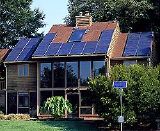Careful planning can decrease the amount of energy consumption of an off-grid building — a key issue if you don’t want to maintain a shed full of batteries. A house built with energy efficiency in mind can consume as little as a tenth of the average grid connected house! Here are things to consider:

Most attention should be given to the ‘thermal envelope’: walls, windows and anything that separates the interior from exterior. First, insulate the walls of the foundation as well as the living space. This can be done by incorporating a combination of plywood and either foamboard or concrete into the main walls. Or you can use thermally-efficient building materials such as blocks made of a lightweight but durable recycled wood particle concrete, reinforced with steel bars � they�ll provide a structural wall system that increases the insulation level.
For the floors, rigid board insulation is the best option: placed under the concrete slab, this high-performance, waterproof insulation helps raise the temperature of the floor slab. It loses up to 75% less heat through the slab than conventional construction.
Windows need to be well sealed and carefully orientated — houses lose around 25% of their heat through the windows. In cold countries, most windows should be on the south-facing wall to capture as much solar energy as possible, the opposite in hot countries. Also, skylights are a good way to reduce the need for artificial light and save electricity.
Heat-producing appliances such as fridges and water heaters — make sure you get energy-efficient ones — should be located in the basement, so that the heat is not lost and can diffuse upwards through the house.
To recycle heat, you can also install a heat recovery ventilator. This device recovers 70 per cent of the heat from stale indoor air while providing a continuous supply of fresh air to the home.
These first steps should dramatically reduce heating and cooling needs of the house and save a lot of energy. An energy efficient home will also be more comfortable that other houses, as the temperature is be more stable, drafts are reduced and humidity is better controlled.
Links
The Green Pages a directory of green technology providers, for water heaters, coolers, etc
Earth House homes for sales, architects, materials providers etc
Buildinggreen.com Get access to Environmental Building Magazine (have to subscribe to get full access).
Sustainableabc.com Sustainable Architecture, building and culture
